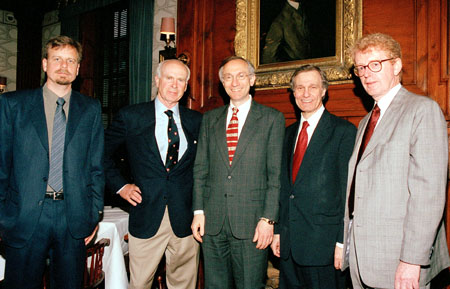China Project honors alumnus Gilbert Butler

The University Center for the Environment (HUCE) hosted a reception for Gilbert Butler Jr. ’59 honoring his generous support of the China Project – Harvard’s multidisciplinary research program on energy use and environmental protection in China and the role of environment in Sino-American relations. The May 15 event was hosted by Provost Harvey V. Fineberg and Michael B. McElroy, director of HUCE and Gilbert Butler Professor of Environmental Studies. President Neil L. Rudenstine and Angelica Zander Rudenstine attended the reception as well.
“Gilbert Butler’s wholehearted support of environmental studies at Harvard, and of the China Project in particular, ensures that the University will continue to lead in this crucial field of endeavor,” said Fineberg, who has overseen the interfaculty initiative for the environment for the past three years. “His personal dedication to environmental protection is deep, his love for Harvard inspiring, and his decision to combine these two passions presents a model for informed philanthropists.”
McElroy added, “It’s imperative to tackle environmental issues – including international ones like those covered in the China Project – from a comprehensively multidisciplinary approach. We are very fortunate to have a supporter, Gil Butler, who understands this logic and appreciates the challenges it poses.”
A personal commitment
Butler endowed a fund for environmental studies at Harvard in honor of his four uncles (Francis Kernan ’24, L.L.B. ’27; Richard D. Kernan ’31, B ’32; Thomas S. Kernan ’29, J.D. ’32; and Walter A. Kernan ’36, L.L.B. ’39), who supported him throughout his education at Milton Academy and at Harvard. The Kernan Brothers Fund benefits scholars – known as Kernan Brothers Fellows – in carrying out projects leading to the solution of problems that contribute to environmental degradation in this country and around the world. Chris Nielsen, the executive director of the China Project, serves as the first Kernan Brothers Fellow.
President of Butler Capital Corp. in New York, Butler reserves much of his time and philanthropic resources for environmental issues. He first became involved in environmental studies at Harvard in 1991 when Rudenstine announced the formation of an interfaculty initiative on the environment – the University Committee on Environment – and now serves on its advisory board. Fineberg recently announced the University’s permanent commitment to the committee’s educational and research programs with the establishment of the Harvard University Center for the Environment.
“The environmental movement has become the focus of my life,” said Butler, who endowed the Butler Professorship in 1983. “I hope that Harvard, with this kind of support, can play a leadership role and exert a long-term impact on major problems confronting us all through the University’s scientific investigation of the causes of environmental degradation.”
The China Project
The China Project explores ways to integrate policy responses to local Chinese air pollution and to global climate change caused by greenhouse gases, of which the two leading sources are the United States and China. More than 40 researchers from the two countries participate in the project’s studies, working in disciplines that range across natural, applied, and health sciences; economics; law; public policy, and other fields. Researchers from Harvard collaborate closely with researchers at Tsinghua University and other Chinese institutions.
“Our largest initiative to date will estimate the total health impact of air pollution in China,” said Nielsen. “This links together five separate studies, each conducted with Chinese counterparts: first, a model developed by Dale Jorgenson of the Faculty of Arts and Sciences (FAS) and the Kennedy School estimates economic growth, fossil energy use, and emissions in China over coming decades; second, Mike McElroy of the FAS and the Division of Engineering and Applied Sciences is modeling how these and other pollutants are affected by atmospheric chemistry and physics; third, a broad team is then tackling exposure assessment, determining how many people are at risk of inhaling these pollutants; fourth, epidemiological studies led by Xiping Xu of the School of Public Health (SPH) will offer estimates of the total respiratory-health impact of these exposures; and finally, James Hammitt of the SPH explores ways to translate the health effects back into economic values. This last step is motivated by top policy makers in China, who emphasize to us that monetary estimates of the damages of air pollution are important in Chinese policy processes.”
Nielsen emphasized that throughout the project, Harvard’s researchers have worked closely with those in China. “This kind of research must be authentically collaborative. Certainly, Chinese scholars and decision makers can learn much from U.S. environmental experience. But, likewise, U.S. inaction on climate change reflects how much Americans have to learn from the Chinese and others about development needs and vulnerabilities in poorer parts of the world. Building knowledge jointly is intellectually essential, and it yields results with more credibility in policy circles, whether in China or the United States.”
The team intends, according to Nielsen, to report results of this and other China Project studies to Chinese officials at a spring 2002 workshop with local partners, in Beijing.
“Gil Butler’s support underwrites all of these efforts in a significant and ongoing way,” Nielsen concluded. “It allows us to focus our time on research and reaching out to new people, whether at Harvard or in China.”




